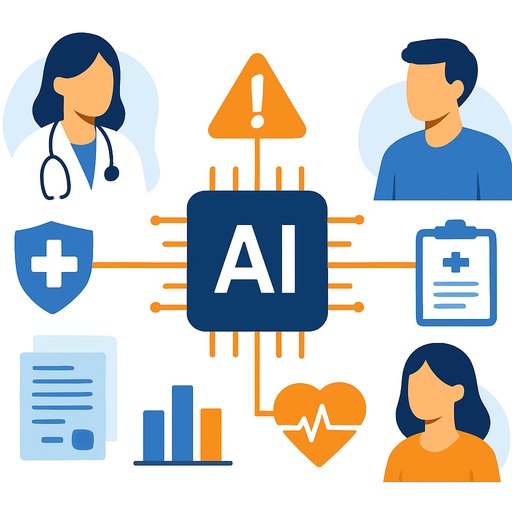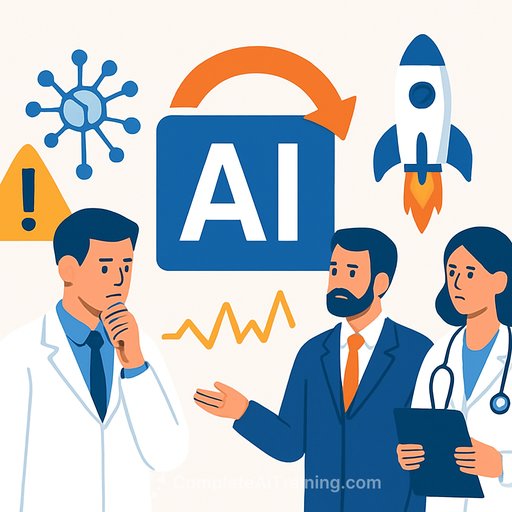AI in Health Care: Transforming the APAC Region
Artificial intelligence is reshaping many industries, and health care is among the most affected. In the Asia-Pacific (APAC) region, AI offers significant opportunities to improve diagnostics, customize treatment plans, accelerate drug discovery, and enhance patient support. These advances are crucial for improving health care delivery and disease management across diverse APAC countries.
However, adopting AI in health care within APAC comes with challenges. Privacy concerns, regulatory gaps, and ethical questions must be addressed to fully benefit from AI technologies. Overcoming these barriers is essential for the region’s health systems to progress.
AI Adoption Trends in APAC Health Care
AI adoption varies widely across APAC. Some countries are moving swiftly, while others lag behind due to infrastructure and policy limitations.
- China is a leader, with its AI health care market expected to grow from $0.55 billion in 2022 to $11.91 billion by 2030, at a compound annual growth rate (CAGR) of 46.72%.
- Japan is expanding steadily, with projections reaching $1.87 billion by 2030 and a CAGR of 21.7%.
- South Korea is also accelerating, anticipated to grow from $0.1 billion in 2022 to $2.11 billion by 2030, with a CAGR of 46.22%.
- Meanwhile, countries like Laos, Cambodia, Myanmar, and Timor-Leste have been slower to integrate AI, often due to limited strategies and regulatory frameworks.
1. Data Privacy and Security Concerns
Data privacy tops the list of concerns for patients and health professionals in APAC. Many emphasize the importance of managing data locally on national servers to protect sensitive information. There is widespread worry about misuse or breaches when patient data is used in AI systems.
Ensuring anonymity and compliance with strict privacy standards is critical. Dedicated security measures are required to build trust and encourage data sharing necessary for AI applications.
2. Fragmented Health Care Infrastructure
Many APAC countries still rely on outdated manual processes, hindering AI integration. The lack of standardized data protocols and underdeveloped digital infrastructure makes it challenging to scale AI solutions or adapt workflows as needed.
Digital transformation is key to improving efficiency. AI can assist through precision medicine, embedded sensors, and robotic surgery to reduce repetitive tasks and lighten provider workloads.
3. Talent and Skills Gap
The health care workforce in APAC requires upskilling to handle AI tools effectively. Although over 92% of employers plan to incorporate AI, 71% of employees are unclear about the skills they need.
This gap affects trust and understanding of AI among professionals and patients alike. With an expected shortage of 6.9 million health care workers in Southeast Asia by 2030, AI could provide essential support. Training programs are vital to prepare staff for AI integration.
4. Limited Access to High-Quality Data
Data silos and inconsistent health records pose challenges for AI development. Industry-wide collaboration among developers, medical professionals, and governments is necessary to improve data sharing and trust.
Promoting interoperability will enable smoother information flow and better AI-driven health care solutions.
5. Regulatory and Ethical Uncertainty
AI is advancing faster than regulations in many APAC countries, creating uncertainty and slowing adoption. There is no unified law governing AI-enabled medical technology across the region.
Some nations are making progress:
- Japan introduced the 2023 Next-Generation Medical Infrastructure Act to support AI research and diagnostic tools.
- Singapore has published Artificial Intelligence in Healthcare Guidelines to promote safe AI development.
- China relies mainly on administrative standards, which are less comprehensive.
6. Cost and ROI Issues
High upfront costs deter many smaller hospitals and facilities in less developed economies from adopting AI. Limited budgets make large-scale AI investments difficult.
Cost-effective alternatives such as plug-and-play AI solutions, pay-as-you-go cloud services, and partnerships with other institutions can help overcome financial barriers.
The Road Ahead for AI in APAC Health Care
The APAC region faces clear challenges in adopting AI for health care, but the potential benefits are significant. Focused efforts on innovation, collaboration, and addressing privacy, infrastructure, and regulatory gaps will help unlock AI’s value for health care providers and patients alike.
For health care professionals interested in expanding their AI knowledge and skills, exploring specialized training can provide a practical advantage. Resources like Complete AI Training’s health care courses offer targeted learning to help integrate AI into medical practice effectively.
Your membership also unlocks:






